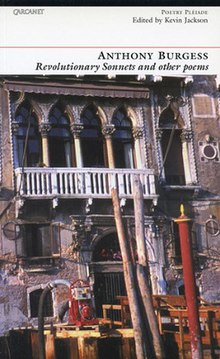
Poetry is a form of literary art that uses aesthetic and often rhythmic qualities of language to evoke meanings in addition to, or in place of, literal or surface-level meanings. Any particular instance of poetry is called a poem and is written by a poet. Poets use a variety of techniques called poetic devices, such as assonance, alliteration, euphony and cacophony, onomatopoeia, rhythm, and sound symbolism, to produce musical or incantatory effects. Most poems are formatted in verse: a series or stack of lines on a page, which follow a rhythmic or other deliberate pattern. For this reason, verse has also become a synonym for poetry.

The term sonnet derives from the Italian word sonetto. It refers to a fixed verse poetic form, traditionally consisting of fourteen lines adhering to a set rhyming scheme. Originating in 13th century Sicily, the sonnet was in time taken up in many European language areas, mainly to express romantic love at first, although eventually any subject was considered acceptable. Many formal variations were also introduced, including abandonment of the quatorzain limit - and even of rhyme altogether in modern times.

John Anthony Burgess Wilson, who published under the name Anthony Burgess, was a British writer and composer.
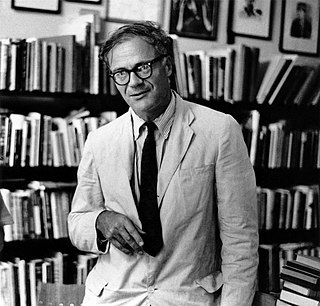
Robert Traill Spence Lowell IV was an American poet. He was born into a Boston Brahmin family that could trace its origins back to the Mayflower. His family, past and present, were important subjects in his poetry. Growing up in Boston also informed his poems, which were frequently set in Boston and the New England region. The literary scholar Paula Hayes believes that Lowell mythologized New England, particularly in his early work.
A rhyme scheme is the pattern of rhymes at the end of each line of a poem or song. It is usually referred to by using letters to indicate which lines rhyme; lines designated with the same letter all rhyme with each other.
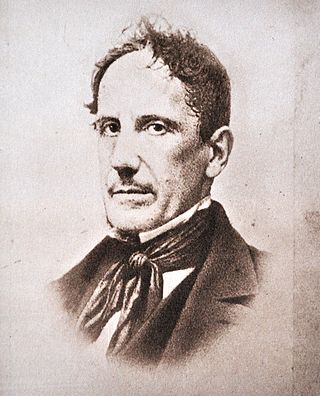
Giuseppe Francesco Antonio Maria Gioachino Raimondo Belli was an Italian poet, famous for his sonnets in Romanesco, the dialect of Rome.
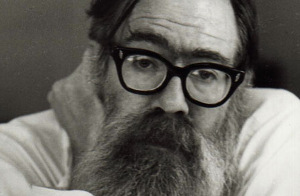
John Allyn McAlpin Berryman was an American poet and scholar. He was a major figure in American poetry in the second half of the 20th century and is considered a key figure in the "confessional" school of poetry. His 77 Dream Songs (1964) won the 1965 Pulitzer Prize for Poetry.

ABBA ABBA is the 22nd novel by English author Anthony Burgess, published in 1977. It consists of two parts: the first is about the last months in the life of John Keats and his encounters with the Roman (dialectal) poet Giuseppe Gioacchino Belli. The second presents an English translation of a sequence of blasphemous sonnets by Belli.

Elizabethan literature refers to bodies of work produced during the reign of Queen Elizabeth I (1558–1603), and is one of the most splendid ages of English literature. In addition to drama and the theatre, it saw a flowering of poetry, with new forms like the sonnet, the Spenserian stanza, and dramatic blank verse, as well as prose, including historical chronicles, pamphlets, and the first English novels. Major writers include William Shakespeare, Edmund Spenser, Christopher Marlowe, Richard Hooker, Ben Jonson, Philip Sidney and Thomas Kyd.

Leslie Allan Murray was an Australian poet, anthologist and critic. His career spanned over 40 years and he published nearly 30 volumes of poetry as well as two verse novels and collections of his prose writings.

Inside Mr Enderby is the first volume of the Enderby series, a quartet of comic novels by the British author Anthony Burgess.
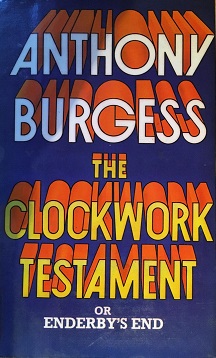
The Clockwork Testament is a novella by the British author Anthony Burgess. It is the third of Burgess' four Enderby novels and was first published in 1974 by Hart-Davis, MacGibbon Publishers. It is usually subtitled Enderby's End, as it was originally intended to be the last book in the Enderby series. However, a further sequel, Enderby's Dark Lady, followed in 1984.
This is a glossary of poetry terms.
Robert Nye FRSL was an English poet and author. His bestselling novel Falstaff, published in 1976, was described by Michael Ratcliffe as "one of the most ambitious and seductive novels of the decade", and went on to win both The Hawthornden Prize and Guardian Fiction Prize. The novel was also included in Anthony Burgess's 99 Novels: The Best in English Since 1939 (1984).

The Eve of Saint Venus is a story or, as author Anthony Burgess put it, an "opusculum", on the theme of marriage. Originally conceived as a play in three acts in 1952, it was re-written as a novella after the author initially failed to find a theatre willing to stage the play. The novella was first published in 1964. The play version of the work premiered in 1979.
This is a list of works by the English writer Anthony Burgess.
An Eton Poetry Book is an anthology edited by Cyril Alington and George Lyttelton, with an introduction by A. C. Benson. The editors' intentions were "to provide poems which boys might reasonably be expected to like" and "to awaken their metrical sense." The book was published in 1925, with a second impression in 1927 and a third in 1938.
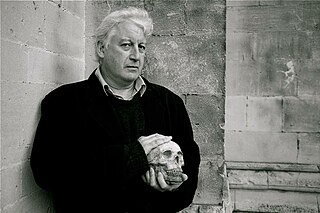
Kevin Jackson was an English writer, broadcaster, filmmaker and pataphysician.
Liana Burgess was an Italian translator and literary agent who was the second wife of English writer Anthony Burgess. Burgess and Macellari had embarked on an affair while Burgess was married to his first wife, and Macellari gave birth to a son nine months after their meeting. The couple became tax exiles in the late 1960s, living in Malta and Italy, and spent several years in the United States. They finally settled in Monaco. Macellari played an important role in Burgess's later literary career, negotiating film rights and acting as his European literary agent, and translating his novels.

Voyage of the Sable Venus and Other Poems is the debut collection of poetry by Robin Coste Lewis, published in 2015 by Alfred A. Knopf. The title poem, 79 pages long, is named for an image by British painter Thomas Stothard. The collection won the National Book Award for Poetry, the first debut collection to win the award since 1974.
